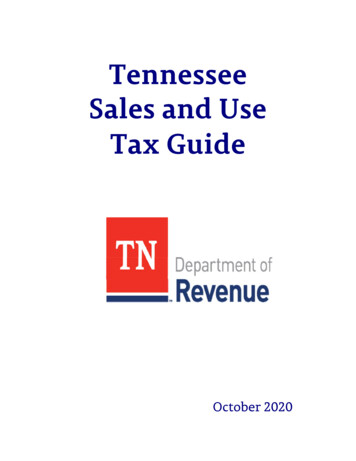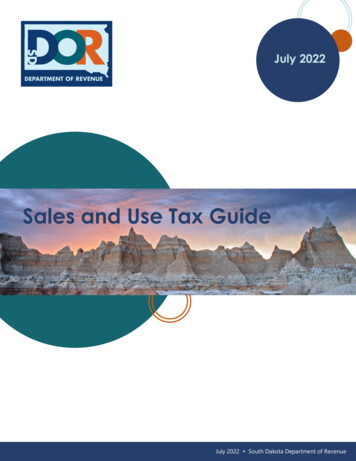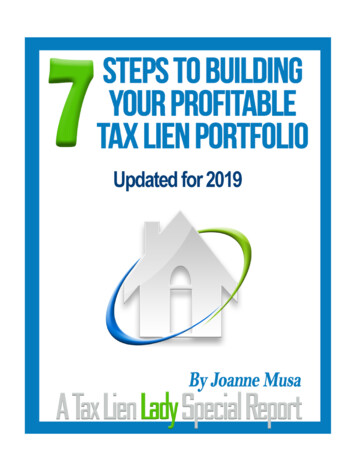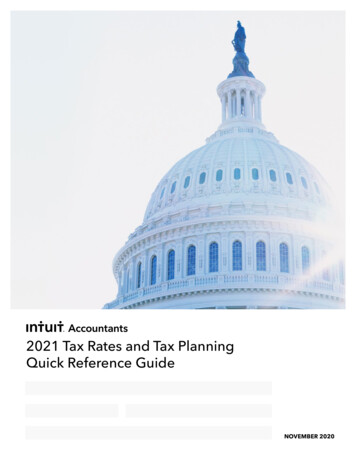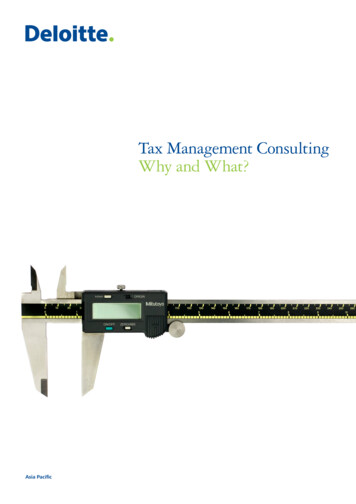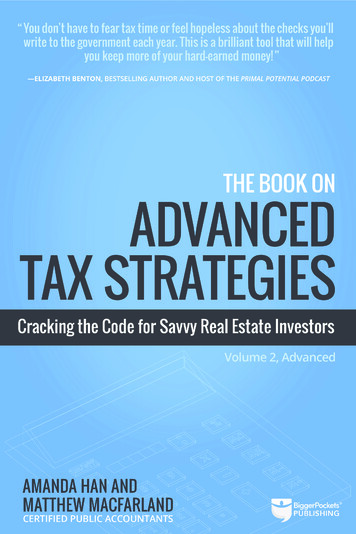
Transcription
THE BOOK ONADVANCED TAXSTRATEGIESCracking the Code for Savvy Real Estate InvestorsVOLUME 2AMANDA HAN AND MAT THEW MACFARL ANDDenver, Colorado
This publication is protected under the U.S. Copyright Act of 1976 and all other applicable international, federal, state, and local laws, and all rights are reserved, including resale rights:You are not allowed to reproduce, transmit, or sell this book in part or in full without thewritten permission of the publisher.Limit of Liability: Although the author and publisher have made reasonable efforts to ensurethat the contents of this book were correct at press time, the author and publisher do not make,and hereby disclaim, any representations and warranties regarding the content of the book,whether express or implied, including implied warranties of merchantability or fitness for aparticular purpose. You use the contents in this book at your own risk. Author and publisherhereby disclaim any liability to any other party for any loss, damage, or cost arising from orrelated to the accuracy or completeness of the contents of the book, including any errors oromissions in this book, regardless of the cause. Neither the author nor the publisher shall beheld liable or responsible to any person or entity with respect to any loss or incidental, indirect, or consequential damages caused, or alleged to have been caused, directly or indirectly,by the contents contained herein. The contents of this book are informational in nature andare not legal or tax advice, and the authors and publishers are not engaged in the provision oflegal, tax, or any other advice. You should seek your own advice from professional advisors,including lawyers and accountants, regarding the legal, tax, and financial implications of anyreal estate transaction you contemplate.The Book on Advanced Tax Strategies: Cracking the Code for Savvy Real Estate Investors, Volume 2Amanda Han and Matthew MacFarlandPublished by BiggerPockets Publishing LLC, Denver, COCopyright 2020 by Tax Strategies Institute, LLCAll Rights Reserved.Publisher’s Cataloging-in-Publication dataNames: Han, Amanda, author. MacFarland, Matthew, 1975- author.Title: The book on advanced tax strategies: cracking the code for savvy real estate investors/ by Amanda Han, CPA and Matthew MacFarland, CPA.Description: Denver, Colorado: BiggerPockets Publishing, [2019] Includes bibliographicalreferences.Identifiers: LCCN 2019034495 (print) LCCN 2019034496 (ebook) ISBN 9781947200227(paperback) ISBN 9781947200289 (ebook)Subjects: LCSH: Income tax—United States. Real estate investment--United States. Income tax deductions—United States. Taxation—United States. Real estate investment—Taxation—Law and legislation—United States—Popular works.Classification: LCC HJ4653.R4 .H36 2019 (print) LCC HJ4653.R4 (ebook) DDC343.7305/246—dc23LC record available at https://lccn.loc.gov/2019034495LC ebook record available at https://lccn.loc.gov/2019034496Published in the United States of AmericaPrinted on recycled paper10 9 8 7 6 5 4 3 2 1
INTRODUCTIONCRACKING THE TAX CODETax law is convoluted and getting more complicated every day. Try reading the Internal Revenue Code for ten minutes and you will feel like Alicein Wonderland chasing a rabbit down a rabbit hole. People often ask uswhy the tax law is so complicated.The reason for the complexity of our tax code is that it was not designed simply to collect tax revenue—the truth is, our tax system wasdesigned with many other goals in mind as well. Besides raising revenue,taxes are designed to both stimulate the economy and to influence socialbehavior. Tax benefits are provided to those who exhibit the intendedbehavior, while tax hurdles exist to discourage people from unwantedbehavior. Investing in real estate is one of the behaviors that the government wants to encourage, so the tax code is filled with benefits andloopholes that incentivize us to use real estate to grow our wealth.Contrary to popular belief, having a higher income doesn’t have tomean paying more in taxes. You may have heard that Amazon, the world’slargest retailer, paid zero income taxes in a year when it earned 9.4billion in net profits. This didn’t happen by chance—it was achievedwith careful planning and utilization of the many loopholes that thegovernment intentionally created for taxpayers. Amazon operated theirbusiness to stimulate the economy in the way the government intended,and as a result, the company was able to pay zero taxes. In other words,10
there is nothing illegal about making 9.4 billion in profits and payingno taxes. If companies like Amazon can control how much tax they pay,how can we as real estate investors do the same?This book is designed to help answer this exact question. Believe it ornot, tax breaks are not just for the multi-billion-dollar companies andthe millionaire investors. Tax breaks exist for people from all walks oflife, all types of professions, and all income levels.During speaking events, we meet many real estate investors withall types of backgrounds—from newbie investors looking for their firstdeal to seasoned investors with dozens of properties. We meet activeinvestors involved in wholesale or fix-and-flip projects, as well as investors putting together syndications of large multifamily or commercialdeals, and we truly enjoy speaking with them about their investments,strategies, and goals.Without fail, investors ask us questions they have about their owntaxes. It’s extremely surprising to us that—even though most Americansknow that the tax code favors real estate investors—most investors haveno idea how to actually take advantage of these benefits. What can theydeduct as real estate expenses? Why did their CPA say a home office isnot available for real estate investors? Do they really need an LLC to takeadvantage of the real estate write-offs we shared from the stage?When we wrote our first book, we intentionally chose topics thatwould be easy to explain. Our goal was to help investors build a solidfoundation and understanding of some of the strategies that can be applied to everyday real estate investors. Of course, we could not end thestory there. As real estate investors, it is important to take the next steptoward more advanced tax-saving strategies. After all, why pay UncleSam more than required when the tax code is filled with loopholes forreal estate investors?Since the strategies discussed in this book may be more advanced, wehave tried to simplify the calculations and scenarios as much as possiblewithout losing any of the content. Our hope is that, regardless of yourexperience level in investing and taxes, you can find some golden nuggetshere to help you save taxes year after year. As you will see in the real-lifestories in this book, some of the strategies can help an investor createthousands—or even hundreds of thousands—of dollars in tax savings.The book is not designed to make you a tax expert, but to provideenough information so that you can ask your tax advisor the right quesCracking the Tax Code11
tions. Then you can have productive and strategic planning sessions tosee how these strategies apply to your situation.Let’s face it: Taxes are not a sexy topic. In fact, the majority of Americans despise taxes and everything related to taxes. Although we can allagree that no one is thrilled to “pay” taxes, people dread taxes for manyother reasons. Tax rules are thorny—many people have a fear of the taxcode because of its complexity. Preparing for taxes can be tedious andtime intensive. Although we file taxes every single year, preparing todo them can feel like a whole new learning process every time. Betweenunderstanding what we can deduct, which documents we need, and howto best organize the information, tax time can be a nightmare. Even after spending all that time, many of us may feel helpless and uncertainwhether all that work actually helped to reduce our final tax bill.For most taxpayers, the fear of taxes results in a vicious cycle. Wedread taxes, so we try not to think about taxes. As a result, we may notspend the time needed during the year to capture and track legitimatedeductible expenses. The year goes by, and we realize once again that wecannot hide from Uncle Sam after all. So, in early April, we’re extremely stressed because we now have a very limited amount of time to getour income and expenses together before we need to meet with our taxpreparers. We try our best to dig up receipts and throw them togetherquickly. Because we did not track our expenses throughout the year, welose out on a lot of legitimate tax deductions because we simply cannotremember everything we spent money on during the past year.As a result, we end up with a large tax bill, just like the year before.We painfully write that check to the IRS and promise ourselves we willdo better next year. It’s yet another horrible tax filing experience, andas we leave our tax preparer’s office, we let out a sigh of relief. Thankgoodness, taxes are finally done, and we don’t need to worry about themuntil this time next year. . . .If you can relate to this, you are not alone. This is the relationship thatthe vast majority of individuals have with taxes. Our goal in this book isto help you think differently about taxes and tax planning. We want todemonstrate that, as real estate investors, you can use specific strategiesthat are designed to help you take control of your tax bill and keep moreof your hard-earned money.We know that the tax man comes around each and every year. So instead of burying our heads in the sand and waiting until the last minute12THE BOOK ON ADVANCED TAX STRATEGIES
to confront the tax man, why not take a different approach? What wouldlife be like if we did not fear taxes but instead embraced them? What ifwe turned the tables on the IRS and made the tax law work for us insteadof against us?Judge Learned Hand once said that “In America, there are two taxsystems: one for the informed and one for the uninformed. Both are legal.” He is exactly right: The U.S. tax system does have different resultsfor different taxpayers. The truth is that tax law is not designed to befair. This may be hard to believe, but even two taxpayers who make thesame amount of income may pay very different amounts in taxes. Don’tbelieve us? Let's take Bill and Allen, for example.Bill makes 95,000 of income from his full-time job as an engineer.His only deduction is the standard deduction that the government allowseach year. Between federal income taxes, state income taxes, and payrolltaxes, he is paying up to 40 percent in taxes.His friend Allen, on the other hand, makes 95,000 of rental incomefrom his various properties. As you may have guessed, the tax code isfilled with perks and loopholes that Allen can take advantage of. He canwrite off his business-related car expenses, home office expenses, business travel and meals, and depreciation expense, to name a few. After allis said and done, Allen pays zero federal income taxes, zero state incometaxes, and zero payroll taxes.Both taxpayers make 95,000. One pays 40 percent in taxes and theother one pays no taxes at all. Does this seem fair? Of course not. Aswe have said before, the tax law is not intended to be fair. Instead, it isdesigned to elicit certain behaviors by providing tax benefits for thosebehaviors. Knowing that the United States tax system is not fair, we astaxpayers have a decision to make: Who do we want to be? Bill or Allen?Do we want to lose close to half of our hard-earned money to taxes everysingle year? Or do we want to use the tax code to our advantage and startto shift our behavior to help reduce our tax burden every year?You may be thinking: Who doesn’t want to be like Allen? Being able tolive off of rental income without needing to work, and paying no taxes inthe meantime? As ideal as that seems, I just don’t know how that can everapply to my situation.If real estate is one of your investment vehicles, it is possible to achieveoptimal tax savings with proper planning. Anyone has the ability tochange their tax profile, but as with many things in life, it often takesCracking the Tax Code13
time to change. You may not be able to go from paying 50 percent taxesto paying no taxes immediately this year. In fact, for the vast majorityof you reading this book, your tax bill may not be completely eliminatedthis year. However, with proper planning, you do have the ability to reachoptimal tax savings in the long run.There is a saying that someone is sitting in the shade today becausesomeone planted a tree many years ago. The same can be applied toward taxes. We should take the time now to empower ourselves withthe tax-savings tools that are available to us. Taxes saved means moremoney that we can use to invest and grow our wealth in tax-efficientinvestments. With the tax-efficient income we generate, we can investin more real estate and generate more tax-efficient income. Before long,we may be in a position to make taxes work for us instead of us workingto pay our taxes.As we mentioned before, anyone can change their tax profile and startto reduce their taxes. To demonstrate that, let’s see how someone like Billcan apply this concept to help reduce his own taxes.From Lazy Assets to Tax-Saving InvestmentsYear after year, Bill would always over-withhold on his paychecks. Hesimply loved the idea of the IRS sending him a refund check every year.To Bill, the larger the refund check, the better he felt he did on his taxfiling. When we met Bill for the first time, we told him that getting a largerefund was not the best tax strategy. In fact, it was a terrible idea andnot a strategy at all! Just because Bill overpaid and received a refund didnot mean that Bill reduced his taxes. What it meant is that he made aninterest-free loan to the IRS.Last year, Bill received a 20,000 refund once his taxes were filed. Inour first meeting with Bill, we told him that his 20,000 refund was whatwe consider to be a “lazy asset.” In other words, it did not generate any returns. With our advice, Bill decided to reduce his paycheck withholdings.As a result, he had more cash on hand each month. Instead of giving aninterest-free loan to the IRS, Bill kept that 20,000 during the year andutilized it as a down payment and bought a 100,000 rental property. Byputting that 20,000 lazy asset to work, Bill made 8,500 of rental incomethat he otherwise would not have earned if he had continued to prepayhis taxes to the IRS.14THE BOOK ON ADVANCED TAX STRATEGIES
As an investor, Bill was on a new path toward tax savings. He wasable to take full advantage of the loopholes in the tax code that he was nototherwise able to utilize before. He could reduce his taxes with legitimatebusiness write-offs such as car, travel, meals, home office, and depreciation. With the right tax plan in place, Bill was able to wipe out the taxeson the 8,500 of his rental income. He could keep the entire 8,500 thathe made without paying part of it to the IRS this year.With some additional planning using some of the strategies we coverin this book, we were also able to help Bill supersize his write-offs wherean additional loss of 20,000 was created. These losses were then utilizedto offset Bill’s taxes from his W-2 income. At a federal and state incometax rate of just under 40 percent, the 20,000 additional loss could saveBill another 8,000 in taxes.By shifting his tax dollars to real estate investments, this smallchange resulted in 16,500 of additional cash in his pocket. What couldBill do with that additional cash? Well, maybe he could consider utilizingthat as a down payment to purchase another 100,000 rental property tocreate even more tax-efficient income.At first glance, it may have seemed impossible for Bill to take advantage of the tax code. As a full-time employee with no investments, Billappeared to be out of luck. But with even such a small shift, Bill wasstarting to utilize the tax code to his advantage. If Bill is able to replicatethis strategy year after year, it may not be long before he can have enoughrental income to replace his earnings from his job. He may then be in aposition to live tax efficiently, just like his friend Allen.As you can see, the tax code can be cracked. It can be utilized to workfor you instead of working against you. Is it easy to crack the tax code?Unfortunately, the answer is no. Just as the tax code is filled with loopholes that can save you lots in taxes, it is also filled with land mines andpitfalls that can trap your tax dollars. Can it be done by the average realestate investor? Absolutely.To crack the tax code and have it work for your benefit, there are a fewinitial points that you should understand:#1: Don’t Be AfraidYes, taxes can be intimidating. Let’s face it, with the tax code being over2,600 pages and thousands more in regulations, court cases, and rulings, itis nearly impossible for anyone to claim they are an expert on all things taxes.Cracking the Tax Code15
If you have no financial background, taxes may seem like a completelyforeign language. The first step to cracking the tax code is to understandthat you will not know everything there is to know about taxes. No onedoes. Not even the most renowned CPAs in the country. The good news,though, is that the majority of what is in the tax law probably has noimpact on your situation. You don’t need to worry about understandingfarming taxation or manufacturing rules. If you are a real estate investor,only a few sections of the tax law may apply to you, and as long as youhave a basic understanding of those sections, you are ahead of the game.#2: Know the BasicsAlthough you don’t need to know all things tax-related in order to crackthe tax code, you do need to have a general understanding of tax law tohave taxes work for you. You should, for example, learn some of the taxsections that provide benefits specifically for investors. Knowing some ofthe real estate–specific tax benefits—such as depreciation, tax-deferredexchanges, real estate professional status, and self-directed investing—can be significant to you as an investor.We’re not saying that you need to know all the depreciation rulesand regulations. You don’t necessarily need to know how to calculatedepreciation or even how many years to depreciate every single asset.Knowing the basics simply means that you should generally understandhow depreciation works, and more important, how depreciation can helpyou reduce taxes.The goal here is not for you to become a CPA or to teach others taxstrategies. Rather, you need to know enough that you can ask your taxadvisor the right questions.#3: Know When to Ask QuestionsIf cracking the tax code starts by empowering yourself with a basic understanding of relevant tax benefits, then the next action item is to make sureyou have a team of tax experts who can help you take advantage of those taxbenefits. They can also help keep you updated on the latest strategies thatare available as tax law changes. One of the reasons no one can claim to bean expert in all things taxes is the constant change. Many people are excitedto hear of highly publicized changes such as tax reform or tax overhaul,but in reality, tax law changes throughout the year. In fact, on any givenday, a tax court can make a decision that alters or redefines the way a law16THE BOOK ON ADVANCED TAX STRATEGIES
should be interpreted. Those little-known changes can be just as impactfulas those that are highly publicized in the national media.Many investors like to search online for tax-saving solutions. Type in“tax strategies for real estate investors” and you’ll come across hundredsof thousands of articles on this topic. Be careful if you are thinking ofimplementing a strategy by yourself that you learn online. Tax planningis not a do-it-yourself activity. A strategy that worked for your neighborcould end up being worthless to you if you miss any of the underlyingdetails.Does this mean that, as an investor, you need to sign up for news updates on tax changes? Of course not. However, it does mean that if real estate is one of your main wealth-building vehicles, your tax advisor shouldbe someone who specializes in the real estate arena and is up-to-date onthe latest tax changes with respect to real estate. Your job is simply toask the right questions and leverage the expertise of your tax advisors.When we talk about asking questions, we don’t just mean you should bethe one asking questions. Your tax advisor should be asking you questionsas well. For example, when you discuss purchasing a property, your taxadvisor should be asking you, How do you plan to finance the property?How much do you expect to earn from this property? Will there be otherpartners involved? How long do you plan to hold on to the property? Andwhat will be your exit strategy for this property? The answers to thesequestions will help your tax advisor develop a tax-saving plan for you.#4: Plan AheadAs you may have guessed, tax savings don’t just happen by chance. Theyhappen by design with careful and continuous planning. The next stepto cracking the tax code is to plan ahead.There is a major difference between tax planning and tax preparation.Tax preparation is simply reporting to the IRS what you did last year. Ifall you wanted to do was pay your taxes and be done with it, you couldeasily utilize a free online tax software. Tax preparation is when you sitin front of your tax preparer in April and tell them for the first time thatyou sold a property last year for a large gain. You hope they may have astrategy to help you reduce taxes, but they tell you it’s too late. They simply enter in all the income and expenses you provide for last year and giveyou the bad news of how much you need now to pay the IRS.You are reading this book because you want more than that. You wantCracking the Tax Code17
to be proactive in reducing your taxes. You are looking for a tax strategistto plan ahead with you during the year to see what can be done now to reduce your taxes in the future. You want a tax advisor to walk you throughwhat is tax deductible and what is not. For the items that may or maynot be deductible, you want to know what can be done to turn them intolegitimate business expenses. The truth is that there are tax deductionseverywhere; you just need to know how to take advantage of them legally.Many people have the misconception that tax planning is for the superwealthy. That unless you have millions of dollars in income or assets,tax planning is a waste of time and money. It may surprise you that taxplanning often has nothing to do with how much money you make. Forexample, we had a client who had no income and a lot of tax losses afterclaiming depreciation and write-offs on their rentals. Although they hadno income in that year to reduce taxes, one strategy we implemented wasto utilize their tax losses to convert a large chunk of their taxable retirement money into tax-free Roth money. Instead of wasting the tax losses,we helped them take full advantage of the losses by moving money froma taxable bucket into a permanently tax-free bucket for them. How wouldyou like to have tax-free money for the rest of your life? Or how wouldyou like to leave tax-free money to your children and grandchildren sothey never have to pay taxes on that income?Although tax planning is not limited to those with very high income,it often does have a lot to do with what “type” of income you make. Fortunately for us, the tax code heavily favors real estate investors. As aninvestor, you may have heard that there are many wonderful tax perksand loopholes available for us. However, it is important to understandthat since the tax law favors real estate investors, it does not mean thatyour taxes will magically go down because you invest in real estate. Youmust know how to find the strategies, which strategies work in yourunique situation, and more important, how to implement them correctly.#5: Make Tax Savings Part of Your Daily LifeTax planning does not mean speaking with your tax advisors once duringthe year and never calling them again until tax time. One of the easiestways to significantly reduce your taxes is to create systems that will helpyou to consider taxes as part of your everyday decisions.For example, when you are purchasing paper and stamps at yourlocal office supply store, ask yourself whether these are items that are18THE BOOK ON ADVANCED TAX STRATEGIES
ordinary and necessary to you as a real estate investor. If the answer isyes, keep a copy of that receipt and make sure to track that expense as atax-deductible item. If you are planning a vacation and also planning tolook at some investment properties, make sure to speak with your taxadvisor before booking your travel plans. This helps to ensure that youmaximize your tax write-off on that upcoming trip. As an investor, youshould contact your tax advisor before selling any investment properties. If you are selling the properties for a gain, there may be strategiesto defer taxes, as well as strategies to offset the taxes. If you are sellingfor a loss, there may be strategies to help you take the best advantage ofthose losses to create the largest tax refund.Making taxes part of your daily life does not mean you have to walkaround thinking about taxes all day long. All it takes is a little bit of practice to keep taxes in the back of your mind. Tax planning needs to bedone proactively during the year to get the intended results. As indicatedpreviously, tax law changes throughout the year. Your financial situation will likely change throughout the year as well. Tax rates, amounts,limitations, and loopholes are also constantly changing. To keep up todate with the latest tax rates and tax breaks, please visit our site at www.keystonecpa.com to make sure you have access to the latest information.Whether you are an investor who’s been in the industry for decades ora brand-new investor just starting out, the tax code is filled with strategies and loopholes designed to help protect your hard-earned money. Ifyou currently don’t have a plan to reduce taxes, then you will likely end upusing the plan the IRS has in store for you, which effectively is a plan topay the most taxes possible. To have an effective tax plan means findinglegal ways to minimize your taxes and to protect your assets.Can the tax code be broken and used to our advantage as real estateinvestors? Yes. Can we plan proactively to utilize legal tax benefits tocontrol our tax bill? Absolutely. The rest of this book is filled with storiesthat showcase just how powerful these strategies can be and how to usethem correctly to protect your hard-earned money.Cracking the Tax Code19
CHAPTER 1TAX REFORM AND THE SAVVYREAL ESTATE INVESTOR“There may be liberty and justice for all, but thereare tax breaks only for some.”—MARTIN A. SULLIVANAfter more than thirty years, the United States has finally enacted one ofthe most comprehensive tax changes in recent history. Its official nameis “The Tax Cuts and Jobs Act of 2017,” although we will refer to it simplyas “tax reform” in this book. As you may have already guessed, the highly anticipated tax reform left some taxpayers as winners and others aslosers. Fortunately, real estate investors clearly fell within the winners’group. You may already know that, historically speaking, real estate investors have enjoyed some of the best tax loopholes within the tax code,but tax reform actually took the tax benefits to a whole new level. Fromlarger deductions to tax-free income, it has never been more tax efficientto be a real estate investor than it is today. In fact, there is a brand-newtax break called the Opportunity Zone to which we have dedicated anentire chapter later in the book.20
This book is designed to help answer this exact question. Believe it or not, tax breaks are not just for the multi-billion-dollar companies and the millionaire investors. Tax breaks exist for people from all walks of life, all types of professions, and all income levels. During speaking events, we meet many real estate investors with




